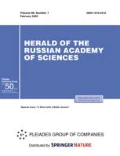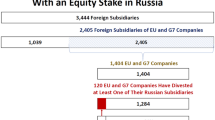Abstract—
The preconditions and recent history of the modern anticartel policy in Russia are considered. It is noted that in countries with traditional market economies, a negative attitude to cartels and tools to counter them were gradually formed during the globalization of national economies and changes in attitudes to national and transnational monopolies. Against the background of the semispontaneous destruction of the planned economy of the Soviet Union and the Russian Soviet Federative Socialist Republic in the 1990s, not only voluntary but also compulsory cartel agreements became widespread, the initiators and main beneficiaries of which were local and regional organized criminal groups, which predetermined the deep criminalization of contractual relations for a decade.
It is argued that the greatest threat to the successful development of Russia as a welfare state comes from the so-called auction cartels, which are, in fact, a “collusion within a collusion”; up to 90% of cartels are concluded in tenders. Cartel superprofits serve as an incentive to bribe the state apparatus.
The main trend of anticartel lawmaking and law enforcement in our country in recent years has been the identification and suppression of the largest cartels, 1/4 of which have signs of criminal acts. It is proposed to solve the problems of decartelization of the Russian economy on the basis of a comprehensive roadmap of anticartel measures, which, in the opinion of the authors of this article, should be included in the new National Plan for the Development of Competition in Russia for 2021–2025, which is currently being developed.
Similar content being viewed by others
Notes
The new reservation (Part 6 of Article 11 of the 2006 Law On Protection of Competition) relates to the right of an economic entity to present evidence of the legality (admissibility) not of a cartel but of other anticompetitive agreements.
Methodological recommendations on the organization of interaction between the FAS and interested law enforcement agencies to identify, disclose, and investigate crimes related to restricting competition (Article 178 of the Criminal Code of the Russian Federation), approved by Order of the FAS Russia no. 1073/19 of August 8, 2019. Consultant-Plus Law Reference System (SPS Consultant-Plus) (accessed May 25, 2020).
See Part 1 of Article 14.32 of the Code of Administrative Offenses of the Russian Federation.
Liability for cartels that caused damage on a large or very large scale or made it possible to extract illegal income on a large or very large scale, as well as quantitative criteria for the corresponding amounts are established by Article 178 of the Criminal Code of the Russian Federation.
REFERENCES
RSFSR Law of July 14, 1990, On RSFSR Republican Ministries and State Committees, Ved. SND RSFSR VS RSFSR, No. 7, 100 (1990).
Resolution of the Council of the RSFSR Ministers of December 25, 1990, No. 601 (revised April 15, 1992, as amended November 24, 1993, On the Approval of the Regulations on Joint Stock Companies, SP RSFSR, No. 6, 92 (1991).
RSFSR Law of March 22, 1991, No. 948-1 (revised July 26, 2006) On Competition and Limitation of Monopolistic Activities in Commodity Markets, Ved. SND RSFSR VS RSFSR, No. 16, 499 (1991).
V. Chernogorodskii, “On the creation of an antimonopoly department,” Konkorentsiya Rynok, Oct., pp. 7–9 (2000).
A. G. Lisitsyn-Svetlanov, “Energy legal policy parameters,” Prav. Energ. Forum, No. 2, 7–15 (2020);
Federal Law of July 26, 2006, No. 135-FZ (revised April 24, 2020) On the Protection of Competition, SZ RF, No. 31 (Part 1), 3434 (2006).
Cartels and Other Anticompetition Agreements, in 2 vols. (Izd. Dom Delo, RANKhiGS, Moscow, 2015) [in Russian].
Yu. G. Shpakovskii and I. V. Popapchuk, “Sherman’s law,” Vestn. Univ. im. O.E. Kutafina (MGYuA), No. 9, 168–170 (2017).
A. G. Sushkevich and S. Yuchinson, Comparative Analysis of Competition Law Objectives of the USA, EU, and Russia (AO Tsentr YurInfoR, Moscow, 2015) [in Russian].
V. Lisitsyna-Svetlanova, “Threats to successful operation of European Union leniency notice,” Russian Law: Theory and Practice, No. 1, 79–90 (2009).
I, V. Bashlakov-Nikolaev, “Forms and methods of management in the field of competition protection,” Tr. Inst. Gos. Prava Ross. Akad. Nauk, No. 6, 39–49 (2015).
K. R. Mirow and H. Maurer, Webs of Power: International Cartels and the World Economy (Houghton Mifflin, Boston, 1981).
Ya. I. Kuz’minov, “The development of imperialism in Germany in the late 19th–early 20th centuries,” in Economic History of Capitalist Countries: A Textbook for Students of Economic Faculties of Universities, Ed. by F. Ya. Polyanskii and V. A. Zhamin (Izd. MGU, Moscow, 1986) [in Russian].
World History (Gospolitizdat, Moscow, 1960), Vol. 7 [in Russian].
I. A. Klepitskii, “Criminal legal protection of competition in the law of France, Germany, and the United Kingdom,” Zakonodanel’snvo, No. 9, 67–77 (2005).
Strafgesetzbuch (StGB). § 298 Wettbewerbsbe-schränkende Absprachen bei Ausschreibungen. https://www.gesetze-im-internet.de/stgb/__298.html. Cited May 16, 2020.
Competition Law of Russia: A Textbook, Ed. by I. Yu. Artem’ev and A. G. Sushkevich (Izd. Dom VShE, Moscow, 2014) [in Russian].
http://Cosultant.ru/law/interwiew/tenishev5. Cited April 25, 2020.
V. L. Shul’ts and S. A. Bochkarev, “A revolutionary dimension to the integrity of law,” Ross. Zh. Prav. Issled., No. 1, 37–48 (2016).
S. V. Maksimov, Yu. G. Vasin, and K. A. Utarov, “Organized crime and the problem of modeling the struggle against it,” Gos. Prav., No. 10, 54–65 (2015).
Combating cartels and other anticompetition agreements: 2019 results (Moscow, 2020), p. 4 [in Russian]. https://fas.gov.ru/p/presentations/585. Cited April 15, 2020.
https://fas.gov.ru/publications/17484. Cited April 15, 2020.
Collusion of robots at medical auctions revealed in Russia. https://www.cnews.ru/news/top/2017-10 30_fas_raskryla_zagovor_robotov_na_meditsinskih_auktsionah. Cited April 15, 2020.
FAS: Signs of medical cartels revealed during tens of thousands of auctions. https://gmpnews.ru/2018/07/fas-priznaki-medicinskix-kartelej-vyyavleny-pri-provedenii-desyatkov-tysyach-aukcionov/. Cited May 10, 2020.
Rosstat presents second GDP estimate for 2019. https://www.gks.ru/folder/313/document/81201. Cited May 10, 2020.
FAS: Number of identified cartels increased in 2019. https://fas.gov.ru/news/29669. Cited April 15, 2020.
Antimonopoly Regulation in the Digital Age, Ed. by A. Yu. Tsarikovskii, A. Yu. Ivanov, and E. A. Voinikanis (Izd. Dom VShE, Moscow, 2018) [in Russian].
FAS: Signs of medical cartels revealed during tens of thousands of auctions. https://gmpnews.ru/2018/07/fas-priznaki-medicinskix-kartelej-vyyavleny-pri-provedenii-desyatkov-tysyach-aukcionov/. Cited May 10, 2020.
FAS: Number of identified cartels increased in 2019. https://fas.gov.ru/news/29669. Cited April 15, 2020.
Combating cartels and other anticompetition agreements: 2019 results (Moscow, 2020), p. 25 [in Russian]. https://fas.gov.ru/p/presentations/585. Cited April 15, 2020.
Decree of the President of the Russian Federation of May 13, 2017, No. 208, On the Strategy of the Economic Security of the Russian Federation for the Period up to 2030, Ross. Gaz., May 15 (2017).
Reports on the number of those convicted for all types of crimes of the Criminal Code of the Russian Federation 2017–2019. Form No. 10-a. http://www.cdep.ru. Cited May 12, 2019.
Decree of the President of the Russian Federation of December 21, 2017, No. 618, On the Main Directions of State Policy for the Development of Competition (together with the “National Plan for the Development of Competition in the Russian Federation for 2018–2020”), SZ RF, No. 52 (Part I), p. 8111 (2017).
A. L. Hillman, Public Finance and Public Policy: Responsibilities and Limitations of Government (Cambridge Univ. Press, Cambridge, 2003).
F. A. Hayek, The Road to Serfdom (Routledge, 1944).
S. S. Zak, Industrial Capitalism in Russia (Sotrudnichestvo, Moscow, 1908), Vol. 7 [in Russian].
V. N. Lopatin, “Competition in the field of scientific activity, criteria for its success, incentives and ratings,” Ross. Konkurent. Prav. Ekon., No. 1, 12–30 (2018).
E. A. Barinov, “Coronavirus: Impact on the economy and financial markets,” Putevod. Predprin. 13 (2), 111–118 (2020).
Order of the Government of the Russian Federation of June 17, 2019, No. 1314-r, Interdepartmental Program of Measures to Identify and Suppress Cartels and Other Agreements Restricting Competition for 2019–2023, SZ RF, No. 26, 3475 (2019).
A. D. Nekipelov, “The crisis in economics, its nature, and ways to recover,” Herald Russ. Acad. Sci. 89 (1), 23–33 (2019).
Funding
This article was supported by the Russian Foundation for Basic Research, project no. 20-010-00773.
Author information
Authors and Affiliations
Corresponding authors
Additional information
Translated by B. Alekseev
RAS Academician Andrei Gennad’evich Lisitsyn-Svetlanov is a Leading Researcher of the RAS Institute of State and Law (ISL RAS). Igor’ Vasil’evich Bashlakov-Nikolaev, Cand. Sci. (Econ.), is an Associate Professor in the Department of Antimonopoly Regulation of Moscow Region State University (MRSU). Vladimir Petrovich Zavarukhin, Cand. Sci. (Econ.), is Director of the RAS Institute for the Study of Science (ISS RAS). Sergei Vasil’evich Maksimov, Dr. Sci. (Law), is a Professor and Chief Researcher of the ISS RAS and an Assistant Head of the Federal Antimonopoly Service (FAS) of Russia.
Rights and permissions
About this article
Cite this article
Lisitsyn-Svetlanov, A.G., Bashlakov-Nikolaev, I.V., Zavarukhin, V.P. et al. Cartelization of the Russian Economy: The Main Causes, Consequences, and Ways of Their Elimination. Her. Russ. Acad. Sci. 90, 567–576 (2020). https://doi.org/10.1134/S1019331620050159
Received:
Revised:
Accepted:
Published:
Issue Date:
DOI: https://doi.org/10.1134/S1019331620050159




